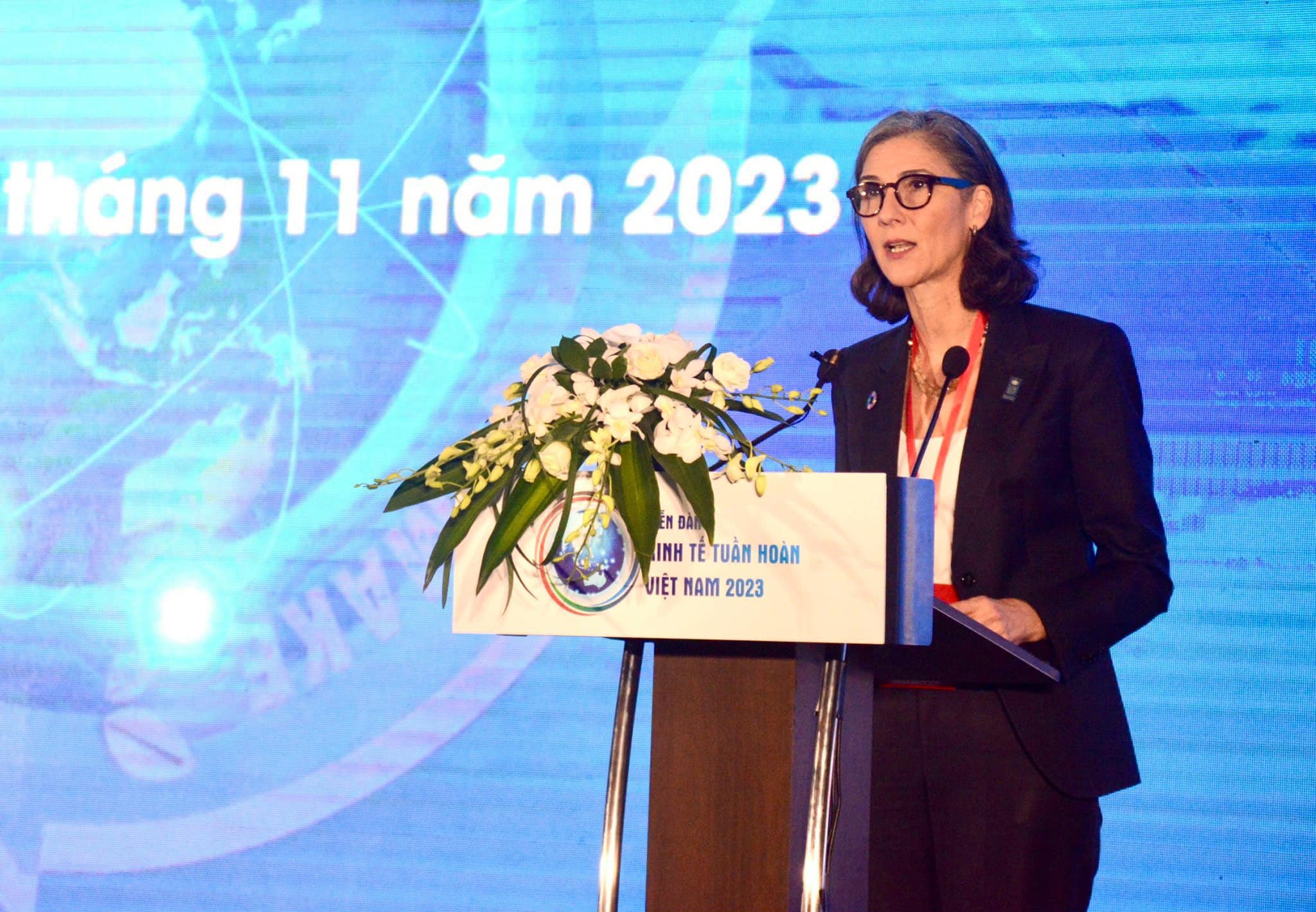Keynote Address by Ms. Ramla Khalidi, UNDP Resident Representative in Viet Nam
Viet Nam Circular Economy Forum – ‘Develop the NAP on Circular Economy in Viet Nam’
November 16, 2023

Excellency Mr. Tran Hong Ha, Deputy Prime Minister of Viet Nam
Excellency Mr. Dang Quoc Khanh, Minister of Natural Resources and Environment
Ladies and Gentlemen,
Good morning!
It’s an honour to join you at this national forum on circular economy. Congratulations to MONRE for organising this successful CE Forum that underlines Viet Nam’s commitment to transform the economy in a way that not only protects the environment but also boosts innovation and competitiveness and improves people’s lives.
Excellencies,
As we head towards COP28, we believe that building a sustainable, low-carbon, inclusive, and prosperous world by 2030 is not only possible but necessary.
This calls for a quantum leap in investments to activate three strategic enablers.
These are product design, digital technology - innovation, and human capital.
Firstly, Circular Economy requires embedding the concept of “design” at its core.
As much as 80 per cent of environmental impacts can be identified at the product design stage.
UNDP recommends adopting an eco-design roadmap, covering prioritized products such as packaging, plastics, textiles, and electronics, with a focus on medium to large enterprises; coupled with policies on ‘green public procurement’ that leverages the purchasing power of the local and central Governments.
Our second enabler is the use of digital technologies and innovation
Not only do digital technologies provide opportunities for circular businesses to thrive, such as with sharing and reusing systems, more efficient sourcing of recycled content, and intelligent value chain management, but they also attract finance in the forms of ODA, venture capital, or public-private partnerships.
In this arena, Viet Nam needs to redouble its efforts, with greater investment in research and development, and advanced digital infrastructures.
And Third, the circular transition is a promising vehicle for enhancing human capital.
Transitioning to upper-middle-income status by the end of the decade, requires transformations of the labor market away from a low-cost, low-skilled workforce. Circular industries can create decent, dignified and green jobs, These, include promoting innovation, increasing access to and quality of education and training, and a renewed emphasis on formalization to ensure that workers are protected from risks including hazardous work conditions and job loss.
To ensure the circular transition is ‘just’, we are developing social inclusivity packages, providing technical and financial support to MSMEs for green pre-commercial opportunities, nurturing skills and promoting entrepreneurship that aligns with circular business models.
In this regard, we can learn from the Just Transition Framework elaborated by UNDP to support the Just Energy Transition Partnership.
Distinguished guests,
As we approach COP 28, we are mindful that circular policies, investments and strategies should contribute to Viet Nam’s climate ambitions.
UNDP has proudly supported the preparation of the NAP, and we are now working on an important aspect, which is to estimate the budget needed to implement the National Action Plan. We are assessing different sources of finance, including public-private partnerships, green bonds, loans, as well as impact investing.
We are also honored to co-host the Viet Nam Circular Economy Hub, the first government-led platform on Circular Economy which was launched here last year.
In closing, allow me to express our sincere appreciation for the strong collaboration with the Government of Viet Nam and MONRE in advancing the country's transition towards a green, sustainable, and circular Viet Nam with peace and prosperity for the people and for the planet. UNDP is proud to accompany the Government along this journey.
Thank you! Xin cảm ơn!

 Locations
Locations



